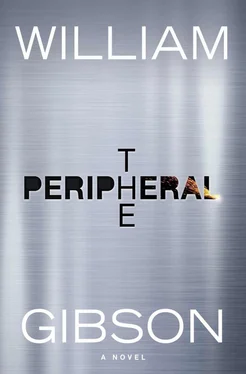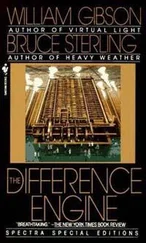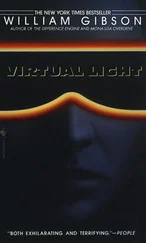William Gibson - The Peripheral
Здесь есть возможность читать онлайн «William Gibson - The Peripheral» весь текст электронной книги совершенно бесплатно (целиком полную версию без сокращений). В некоторых случаях можно слушать аудио, скачать через торрент в формате fb2 и присутствует краткое содержание. Год выпуска: 2014, Издательство: Penguin Group US, Жанр: Киберпанк, на английском языке. Описание произведения, (предисловие) а так же отзывы посетителей доступны на портале библиотеки ЛибКат.
- Название:The Peripheral
- Автор:
- Издательство:Penguin Group US
- Жанр:
- Год:2014
- ISBN:нет данных
- Рейтинг книги:3 / 5. Голосов: 1
-
Избранное:Добавить в избранное
- Отзывы:
-
Ваша оценка:
- 60
- 1
- 2
- 3
- 4
- 5
The Peripheral: краткое содержание, описание и аннотация
Предлагаем к чтению аннотацию, описание, краткое содержание или предисловие (зависит от того, что написал сам автор книги «The Peripheral»). Если вы не нашли необходимую информацию о книге — напишите в комментариях, мы постараемся отыскать её.
The Peripheral — читать онлайн бесплатно полную книгу (весь текст) целиком
Ниже представлен текст книги, разбитый по страницам. Система сохранения места последней прочитанной страницы, позволяет с удобством читать онлайн бесплатно книгу «The Peripheral», без необходимости каждый раз заново искать на чём Вы остановились. Поставьте закладку, и сможете в любой момент перейти на страницу, на которой закончили чтение.
Интервал:
Закладка:
The robot girls started for her, then, but the whitewashed stone wall to her right was smoking, a big square of it falling down, dust, and out of the black hole shot this big red block. Cube, cuboid, thing. A nursery red. Cheerful. She heard the ceramic-looking shells of the robot girls shatter, between it and the far wall. Just hung, shivering, a few feet off the ground, like it was glued there, making a faint revving sound, like internal combustion motorcycles but really far away. Then it flipped, up and off the wall, the robots dropping to the stone floor in pieces, and came down on one of its eight corners without making a sound. And just stayed there, balanced, red, impossible.
“Security,” said the man with the black hat, softly. “Red. Red.”
Was he warning someone about the red thing?
Out of the corner of her eye, she saw Wilf, who must have discovered that his cuffs had crumbled too, starting to stand up too. “Sit the fuck down, Wilf,” she said. He did.
“Hey, Henry,” said a smoothly upbeat male voice, from the head of the stairwell, “sorry I broke your car.” The exoskeleton stepped through the arch, the homunculus on its massive shoulders, under the bell jar. It stopped, seemed to look at the man in the hat, except it didn’t have any eyes you could see.
“Red,” said the man, softly.
“Sorry I killed your driver and your security detail,” said the infomercial voice, like it was apologizing for not having 2-percent milk.
The cube rotated slightly, on the corner it was balanced on. Lowbeer appeared, on a square panel covering most of the nearest face. “You’ll be unhappy to learn, Sir Henry,” Lowbeer said, but not in that bone-static voice, “that your successor is your longtime rival and chief thorn-in-side, Marchmont-Sememov. It’s an inherently awkward position, City Remembrancer, but I’d thought, until this, that you’d done rather well, considering.”
The tall man said nothing.
“A real estate and development scheme, with resource extraction?” Lowbeer said. “And for that you’d see fit to deal with someone on the order of al-Habib?”
The tall man was silent.
Lowbeer sighed. “Burton,” she said, and nodded.
The exoskeleton raised both its arms. The creepily tanned hands were gone, or else in black robotic gloves, both of them in fists now. A little hatch flipped open, on top of the exoskeleton’s right wrist, and the other candy-cane gun popped out. From a second, slightly larger hatch, on the left wrist, emerged Lowbeer’s tipstaff, gilt and fluted ivory. Burton had a better idea of how to aim it, because the tall man just blinked to bone entirely, his empty clothes falling straight down, with a rattle, and his tall hat rolling in a circle on the floor.
“So who do I have to kill,” Flynne said, showing them she still had her own candy-cane gun, “to get somebody to fucking do something, back in the stub, about stopping fucking Homes from killing us all with drones, like right fucking now? Please?”
“Sir Henry’s death has deprived your competitor of the sort of advantage that Lev and I afford you now. I took the liberty of effecting that immediately, upon Sir Henry’s arrival here, this evening, assuming he would prove guilty. Which has resulted in a shift of influence, allowing for Homeland Security’s withdrawal, their orders rescinded.”
“Shit,” said Flynne, lowering the gun, “what did we have to buy to do that?”
“A sufficient share of Hefty Mart’s parent corporation, I gather,” said Lowbeer, “though I haven’t had the details yet.”
“We bought Hefty?”
“Some considerable share of it, yes.”
“How can you buy Hefty?” It was like buying the moon.
“May I stand up?” Wilf asked.
“I want to go home now,” said Daedra.
“I imagine you do,” said Lowbeer.
“My father’s going to be very angry with you.”
“Your father and I,” said Lowbeer, “have known one another for a long time, I’m sad to say.”
Now Ash was in the doorway, in her chauffeur outfit, Ossian behind her, in a black leather coat, the wooden pistol-box under his arm. He crossed to Flynne, eyes on the candy-cane barrel, keeping out of its way. He put the box down on the arm of her chair, where the iron cuff had been, lifted its lid, carefully took the gun from her hand, placed it in its felted recess, and closed the box.
“Goodnight, Miss West,” said Lowbeer, and the screen went blank.
“We’ll be going now,” said Ash. She looked at Daedra. “Except for you.”
Daedra sneered at her.
“And that,” said Ash, gesturing with her thumb at the red cube. Which flung itself, somehow, straight up and then to the side, crashing with a big clang into the white-barred cell doors of the second level, a few lights going out. Then it threw itself to the far side just as loudly. Then somersaulted, fell, to land again on a single point. And began to spin, its corners blurring past, inches from Daedra’s chin. She didn’t move at all.
“Out,” said Ash, “now.”
And then they were single-filing the stairway, Ossian behind her. “What’s Conner doing to her?” she asked, over her shoulder.
“Reminding her of the potential of consequences, at least,” said Ossian, “or attempting to. Won’t harm a hair on her head, of course. Or do a bit of good. Father’s a big American.”
Above them, the sound of crashing iron.
121
There was a park where the assemblers had long since collected, from beneath the deeper oligarchic burrowings in Notting Hill, the various excavating machines which the pre-jackpot wealthy had entombed in situ, back when removing them from whatever deepest point would have cost more than abandoning them beneath concrete. Mechanical sacrifices, like cats walled up in the foundations of bridges. The assemblers, going everywhere, had found them, bringing them to a certain park, their method having been exactly that by which Lowbeer had introduced the Russian pram’s gun to the arm of the peripheral’s interrogation chair, or brought Conner’s terrible cube straight up through the granite foundations of Newgate, astronomical numbers of the microscopic units being employed in shifting particles of whatever intervening matter from front to back, or top to bottom, of the object being moved, solids seeming thereby to migrate through other solids, the way al-Habib had stepped through the curved wall, in Edenmere Mansions.
The rescued excavators, perfectly restored, had been arranged in a circle, their blades and scoops uplifted, paint and windscreens gleaming, to become a favorite of the area’s children, Lev’s among them.
Passing this now in the ZIL, on the way back to Lev’s, the streets quite empty, he saw the moon catch the edge of a digger’s upraised scoop.
He looked at Flynne’s peripheral. She was gone now, back to Coldiron to check on everyone, and he was anxious to reach the Gobiwagen, to access the Wheelie, to see her there, to see what was going on.
Lowbeer’s sigil appeared. “You did very well, Mr. Netherton,” she said.
“I scarcely did anything.”
“Opportunities to do very badly were manifold. You avoided them. The major part in any success.”
“You were right about al-Habib. And the real estate. Why did he kill her?”
“It’s still unclear. She’d been involved with him for some time, apparently was instrumental in bringing her sister aboard. She may have been jealous of his relationship with Daedra, which was largely simultaneous with your own. The aunties’ latest iterations suggest she may have been considering shopping him to the Saudis, or perhaps was merely toying with the thought. They’re a fantastically unpleasant family. I’ve known her father since I was Griff’s age. A co-conspirator in the Gonzalez assassination, so I expect Griff will soon be dealing with him in that light. In our own continuum, however, he’s far too well-connected ever to be troubled by any of this. She’ll need a good publicist, now.”
Читать дальшеИнтервал:
Закладка:
Похожие книги на «The Peripheral»
Представляем Вашему вниманию похожие книги на «The Peripheral» списком для выбора. Мы отобрали схожую по названию и смыслу литературу в надежде предоставить читателям больше вариантов отыскать новые, интересные, ещё непрочитанные произведения.
Обсуждение, отзывы о книге «The Peripheral» и просто собственные мнения читателей. Оставьте ваши комментарии, напишите, что Вы думаете о произведении, его смысле или главных героях. Укажите что конкретно понравилось, а что нет, и почему Вы так считаете.









